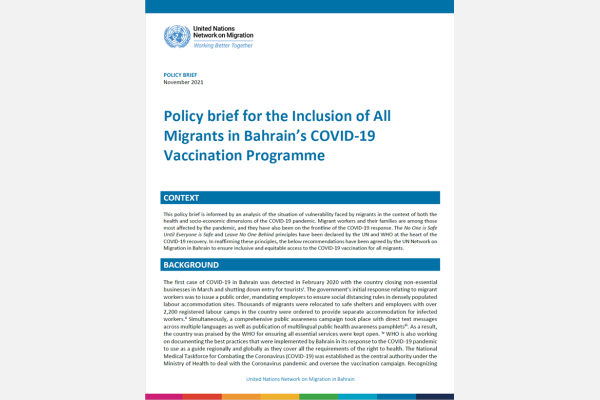Repository of Practices

Policy brief for the Inclusion of All Migrants in Bahrain’s COVID-19 Vaccination Programme
Dates
Type of practice
Summary
Migrant workers and their families have been among the most affected by COVID-19 while they have been also at the forefront of the COVID-19 response. All migrants were provided free access to COVID-19-related health care, including hospitalization with issuance of temporary ID for undocumented workers and suspension of the medical consultation fee for non-residents. The vaccination programme that was rolled out included nationals and migrants on a free and equitable basis. The UN Network on Migration in Bahrain recognised the steps taken towards provision of vaccination for migrants and recognised that certain groups remain outside of the official provision and need further outreach and advocacy, this included migrants in irregular status, vulnerable domestic workers and other categories. UN agencies worked to develop a joint brief which outlined the steps taken and proposed a series of recommendations, as well as targeted support to the government of Bahrain. The brief was shared with the Office of the Prime Minister and was discussed at a subsequent meeting. The government expressed its readiness to work with UN agencies to reach out to vulnerable migrants and provide vaccination.
Organizations
Main Implementing Organization(s)
Detailed Information
Partner/Donor Organizations
Benefit and Impact
Key Lessons
Recommendations(if the practice is to be replicated)
Innovation
Additional Resources
Date submitted:
Disclaimer: The content of this practice reflects the views of the implementers and does not necessarily reflect the views of the United Nations, the United Nations Network on Migration, and its members.
More Related Practices:
- Comité de Cultura de Paz y Derechos Humanos
- Strengthening the capacities and frameworks to collect data and evidence on migration, the environment and climate change (MECC) in Mexico
- Encuesta Nacional Migrante de la Argentina (ENMA)
- A Gender-Focused Qualitative Study on Health Care-Seeking Behavior and Access to Tuberculosis Treatment among Mobile Populations from Moldova
- IOM’s Regional Programme Strengthens the Protection of Child Victims across North Africa and Key Routes
Peer Reviewer Feedback:
*References to Kosovo shall be understood to be in the context of United Nations Security Council resolution 1244 (1999).
Newsletter
Subscribe to our newsletter.